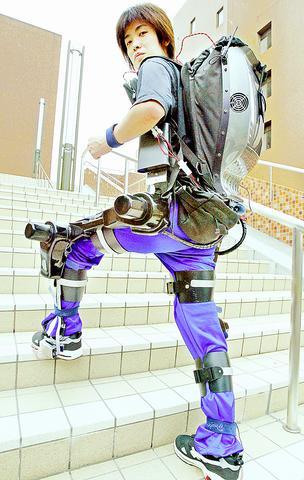Japanese companies are preparing for the commercial launch of a "robot suit" that helps aged or physically disabled people walk, get up the stairs or seat themselves to relax without a chair.
Trading house Mitsui and Co and some 30 other Tokyo firms plan to set up a joint-venture in April or May next year to market the powered suit developed by Yoshiyuki Sankai, professor and engineer at Tsukuba University, officials said yesterday.

PHOTO: AFP
"This is neither a robot in machine factories nor a one for amusement like a pet robot. This is a brand-new proposal projecting a future image of relations between people and robots," Sankai said.
"The suit practically supports people's life, focusing on the strong point of robots," Sankai said.
The powered suit, code-named HAL-3 (Hybrid Assistive Leg), consists of a computer and batteries in the backpack as well as four actuators attached around the knees and hip joints.
The motor-powered devices guide movement of the legs as the computer calculates the user's next motion by detecting faint electric signals from the muscle, the professor said.
With the equipment, the user can walk at a speed of 4km per hour with little physical exertion and avoid the jerky stop-go moves of ordinary robots.
As a first step, the new venture plans to lease or sell 10 prototypes next year, Sankai said.
A mid-term goal for the project is to sell some 100 suits a year at a price of ?1 million (US$8,440).
Sankai also noted that Japan's greying society was a key consideration behind the development of the suit.
"As the country is heading rapidly towards an ageing society, the demand for such a robotic support system will certainly grow," the professor said.
"Not only the elderly but also disabled people will be able to live comfortably, leaving heavy physical tasks to the suit," he said.

Intelligence agents have recorded 510,000 instances of “controversial information” being spread online by the Chinese Communist Party (CCP) so far this year, the National Security Bureau (NSB) said in a report yesterday, as it warned of artificial intelligence (AI) being employed to generate destabilizing misinformation. The bureau submitted a written report to the Legislative Yuan in preparation for National Security Bureau Director-General Tsai Ming-yen’s (蔡明彥) appearance before the Foreign Affairs and National Defense Committee today. The CCP has been using cognitive warfare to divide Taiwanese society by commenting on controversial issues such as Taiwan Semiconductor Manufacturing Co’s (TSMC, 台積電) investments in the

INVESTIGATION: The case is the latest instance of a DPP figure being implicated in an espionage network accused of allegedly leaking information to Chinese intelligence Democratic Progressive Party (DPP) member Ho Jen-chieh (何仁傑) was detained and held incommunicado yesterday on suspicion of spying for China during his tenure as assistant to then-minister of foreign affairs Joseph Wu (吳釗燮). The Taipei District Prosecutors’ Office said Ho was implicated during its investigation into alleged spying activities by former Presidential Office consultant Wu Shang-yu (吳尚雨). Prosecutors said there is reason to believe Ho breached the National Security Act (國家安全法) by leaking classified Ministry of Foreign Affairs information to Chinese intelligence. Following interrogation, prosecutors petitioned the Taipei District Court to detain Ho, citing concerns over potential collusion or tampering of evidence. The

‘COMPREHENSIVE PLAN’: Lin Chia-lung said that the government was ready to talk about a variety of issues, including investment in and purchases from the US The National Stabilization Fund (NSF) yesterday announced that it would step in to staunch stock market losses for the ninth time in the nation’s history. An NSF board meeting, originally scheduled for Monday next week, was moved to yesterday after stocks plummeted in the wake of US President Donald Trump’s announcement of 32 percent tariffs on Taiwan on Wednesday last week. Board members voted to support the stock market with the NT$500 billion (US$15.15 billion) fund, with injections of funds to begin as soon as today. The NSF in 2000 injected NT$120 billion to stabilize stocks, the most ever. The lowest amount it

NEGOTIATIONS: Taiwan has good relations with Washington and the outlook for the negotiations looks promising, Minister of Economic Affairs J.W. Kuo said Taiwan’s GDP growth this year is expected to decrease by 0.43 to 1.61 percentage points due to the effects of US tariffs, National Development Council (NDC) Minister Paul Liu (劉鏡清) said at a meeting of the legislature’s Economics Committee in Taipei yesterday, citing a preliminary estimate by a private research institution. Taiwan’s economy would be significantly affected by the 32 percent “reciprocal” tariffs slapped by the US, which took effect yesterday, Liu said, adding that GDP growth could fall below 3 percent and potentially even dip below 2 percent to 1.53 percent this year. The council has commissioned another institution